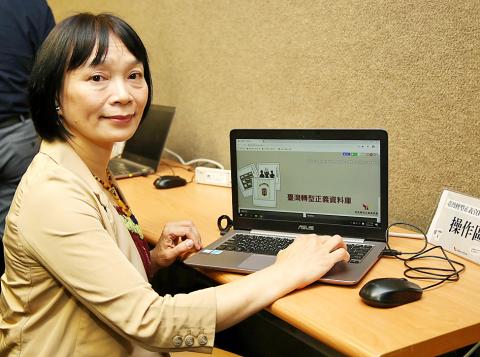Chiang Kai-shek (蔣介石) presided over 3,195 military court cases during the White Terror era, the most on record, the Transitional Justice Commission said yesterday as the Taiwan Transitional Justice Database went online.
The database has records and photographs of victims of political persecution during the White Terror era, as well as the names and ranks of perpetrators, in the hope of enlightening the public about how such trials were conducted, the commission said.
It allows analysis using certain subsets of data, such as ethnicity, gender, place of residence and charge, it said.

Photo: CNA
Then-chief of general staff Chou Chih-jou (周至柔) presided over 2,506 cases, while then-navy commander Kuei Yung-ching (桂永清) was in charge of 1,241 cases, the database shows.
As head of the Chinese Nationalist Party (KMT) government, Chiang had the ultimate say on the rulings and he repealed them in 266 cases, the commission said, adding that the other presiding officers ultimately bowed to Chiang’s will.
The database shows that both Taiwanese and Mainlanders — those who fled to Taiwan from China with the KMT in 1949 — were victims during the White Terror era, with Taiwanese accounting for 55 percent of cases and Mainlanders 44 percent.
The main priority of the commission was to identify victims, how the victims were oppressed and who the oppressors were, commission spokeswoman Yeh Hung-ling (葉虹靈) said.
The database would allow the public to have a better understanding of the cases and help further academic study, as well as providing names of individuals and their actions during the trials, Yeh said.
Due to time and funding constraints, the database does not include information on the arrest and interrogation of victims, or how the ruling was carried out, commission Chairwoman Yang Tsui (楊翠) said.
Such information — such as whether torture was used during interrogation and victims were harassed after their release — would form the basis of further investigation and research, Yang said.
The database would allow the public to learn about what happened during the trials, National Human Rights Museum director Chen Chun-hung (陳俊宏) said, adding that it could help provide the answer to the saying: “There are tens of thousands of political victims, yet there are no oppressors.”
“The establishment of the database is only the first step, and we hope that data on agents of the state and efforts to monitor the movements of the public will also be made public to catalogue historical facts,” Chen said.
The database only includes information on cases taken to court and does not include details of other victims, such as artist Chen Cheng-po (陳澄波) and lawyer Tang Te-chang (湯德章), who were executed without trial, the commission said.
The 228 Incident refers to an uprising that began on Feb. 27, 1947, and was violently suppressed by the KMT government starting the next day.
Estimates of the number of deaths vary between 10,000 and 30,000 or more.
It marked the beginning of the White Terror era.

Alain Robert, known as the "French Spider-Man," praised Alex Honnold as exceptionally well-prepared after the US climber completed a free solo ascent of Taipei 101 yesterday. Robert said Honnold's ascent of the 508m-tall skyscraper in just more than one-and-a-half hours without using safety ropes or equipment was a remarkable achievement. "This is my life," he said in an interview conducted in French, adding that he liked the feeling of being "on the edge of danger." The 63-year-old Frenchman climbed Taipei 101 using ropes in December 2004, taking about four hours to reach the top. On a one-to-10 scale of difficulty, Robert said Taipei 101

Nipah virus infection is to be officially listed as a category 5 notifiable infectious disease in Taiwan in March, while clinical treatment guidelines are being formulated, the Centers for Disease Control (CDC) said yesterday. With Nipah infections being reported in other countries and considering its relatively high fatality rate, the centers on Jan. 16 announced that it would be listed as a notifiable infectious disease to bolster the nation’s systematic early warning system and increase public awareness, the CDC said. Bangladesh reported four fatal cases last year in separate districts, with three linked to raw date palm sap consumption, CDC Epidemic Intelligence

US climber Alex Honnold left Taiwan this morning a day after completing a free-solo ascent of Taipei 101, a feat that drew cheers from onlookers and gained widespread international attention. Honnold yesterday scaled the 101-story skyscraper without a rope or safety harness. The climb — the highest urban free-solo ascent ever attempted — took just more than 90 minutes and was streamed live on Netflix. It was covered by major international news outlets including CNN, the New York Times, the Guardian and the Wall Street Journal. As Honnold prepared to leave Taiwan today, he attracted a crowd when he and his wife, Sanni,

Taiwanese and US defense groups are collaborating to introduce deployable, semi-autonomous manufacturing systems for drones and components in a boost to the nation’s supply chain resilience. Taiwan’s G-Tech Optroelectronics Corp subsidiary GTOC and the US’ Aerkomm Inc on Friday announced an agreement with fellow US-based Firestorm Lab to adopt the latter’s xCell, a technology featuring 3D printers fitted in 6.1m container units. The systems enable aerial platforms and parts to be produced in high volumes from dispersed nodes capable of rapid redeployment, to minimize the risk of enemy strikes and to meet field requirements, they said. Firestorm chief technology officer Ian Muceus said